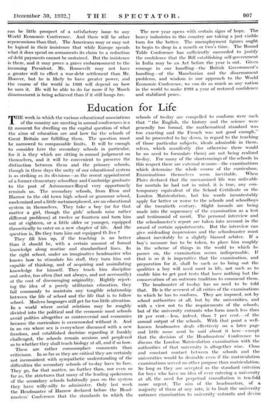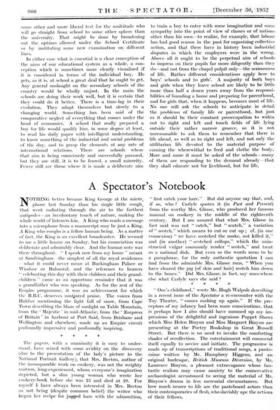Education for Life
THE week in which the various educational associations of the country are meeting in annual conferences is a fit moment for dwelling on the capital question of what the aims of education are and how far the schools of Great Britain are fulfilling them. The question must be narrowed to compassable limits. It will be enough to consider here the secondary schools in particular, for it is they which are sitting in annual judgement on themselves, and it will be convenient to preserve the distinction .between them and the primary schools, though in these days the unity of our educational system is as striking as its divisions—as the recent appointment of a former elementary schoolboy and Cambridge graduate to the post of Astronomer-Royal very opportunely reminds us. The secondary schools, from Eton and Harrow to the old town high school or grammar school, modernized and a little metamorphosed, are an educational system in themselves. They take a boy (or for that matter a girl, though the girls' schools raise rather different problems) at twelve or fourteen and turn him out at eighteen, or a little older or younger, equipped theoretically to enter on a new chapter of life. And the question is, Do they turn him out equipped tb live ?
They fill him up, if the teaching is no better than it should be, with a certain amount of formal knowledge along routine and standardized lines. In the right school, under an imaginative headmaster who knows how to stimulate his staff, they turn him out capable of thinking, and of acquiring and assimilating knowledge for himself. They teach him discipline and order, too often (but not always, and not necessarily) at the cost of discouraging originality. Rightly reject- ing the idea of a purely utilitarian education, they fail commonly to maintain any tangible relationship between the life of school and the life that is to follow school. Modern languages still get far too little attention. In a world where social relations may be roughly divided into the political and the economic most schools avoid politics altogether as controversial and economics because the curriculum is overcrowded without it. And in an era .where sex is everywhere discussed with a new freedom, and established doctrine regarding it frankly challenged, the . schools remain anxious and perplexed as to whether they shall teach biology at all, and if so how.
These are rather commonplace comments than criticisms. In so far as they are critical they are certainly not inconsistent with sympathetic understanding of the difficulties the secondary schools of to-day have to face. They go, for that matter, no further than, nor even so far as, the strictures that many of the leading spokesmen of the secondary schools habitually pass on the system they have willy-nilly to administer. Only last week the Headmaster of Harrow declared before the Head- masters' Conference that the standards • to which the schools of to-day are compelled to conform were such that " the English, the history and the science were generally too formal, the mathematical standard was too exacting and the French was not good enough," and he proceeded to lay down, in regard to the teaching of those particular subjects, ideals admirable in them- selves, which manifestly (for otherwise there would be no need to formulate them) are not being realized to-day. For many of the shortcomings of the schools in this respect there are external reasons—the examinations which determine the whole course of the curriculum. Examinations themselves seem inevitable. When Plato declared that the unexamined life was unlivable for mortals he had not in mind, it is true, any con- temporary equivalent of the School Certificate or the London Matriculation, but his words incontestably . apply for better or worse to the schools and schoolboys of the twentieth century. Slight inroads arc being made into the supremacy of the examination as a test and testimonial of merit. The personal interview and the schoolmaster's report are taken into account in the award of certain appointments. But the interview can give misleading impressions and the schoolmaster must almost inevitably be a slightly biassed arbiter. If a boy's measure has to be taken, to place him roughly in the scheme of things in the world to which he passes on, the examination seems indispensable. If that is so it is imperative that the examination, and preparation for it, shall be such as to bring out the qualities a boy will need most in life, not such as to enable him to get past tests that have nothing but the conservatism of an outworn tradition to commend them.
The headmaster of to-day has no need to be told that. He is the severest of all critics of the examinations to which he has to conform. They are imposed, not by school authorities at all, but by the universities, and with a view not to the requirements of the schools, but of the university entrants who form much less than 10 per cent.—less, indeed, than 7 per cent.—of the annual output of the schools. With that point a well- known headmaster deals effectively on a later page and little more need be said about it here—except that the decision of the Headmasters' Conference to discuss the London Matriculation examination with the authorities of that university is altogether wise. Close and constant contact between the schools and the universities would be desirable even if the matriculation examinations served no other purpose than matriculation. So long as they are accepted as the standard criterion for boys who have no idea of ever entering a university at all, the need for perpetual consultation is ten-fold more urgent. The aim of the headmasters, of a Majority of them at any rate, is to limit the university entrance examination to university' entrants and devise some other and rnore- liberal test for the multitude who will go straight from school to sonic other sphere than the university. That might be done by broadening out the options allowed under the School Certificate or by instituting some new examination on different lines.
In either case what is essential is a clear conception of the aims of our educational system as a whole, a -con- ception which is sometimes more clearly visualized if it is considered in terms of the individual boy. He gets, as it is, at school a great deal that he ought to get. Any general onslaught on the secondary schools of the country would be wholly unjust. In the main the schools are doing their work well, but it is certain that they could do it better. There is a time-lag in their evolution. They adapt themselves but slowly to a changing world. Something has been said of the comparative neglect of everything that comes under the head of economics. A school that really prepared a boy for life would qualify him, in some degree at least, to read his daily paper with intelligent understanding, to know something of the industrial and social problems of the day, and to grasp the elements at any rate of international relations. There are schools where that aim is being consciously and successfully pursued, but they are still, it is to be feared, a small minority. Fewer still arc those where it is made a deliberate aim to train a boy to enter with sonic imagination and some sympathy into the point of view of classes or of nations other than his own—to realize, for example, that labour has had good reason in the past for organizing collective action, and that there have in history been industrial disputes in which the employers were in the wrong. Above all it ought to be the perpetual aim of schools to impress on their pupils far more -diligently than they do—and not from the chapel pulpit only—the seriousness of life. Rather different considerations apply -here to boys' schools and to girls'. A majority of both boYS and girls when they leave school are likely to be little more than half a dozen years away from the responsi- bilities of founding a home and preparing for parenthood, and for girls that, when it happens, becomes most of life. No one will ask the schools to anticipate in detail the problems of family life or parenthood, -but just as it should be their constant preoccupation to widen out to right and left and touch fields • of life .lying outside their rather narrow groove, so it is not unreasonable to ask them to remember that. there is life ahead, as well as to right and left, and not only the utilitarian life devoted to the material purpose of earning the wherewithal to feed and clothe the body. More and more it must be asked of the schools—many of them are responding to the demand already—that they shall educate not for livelihood, but for life.































 Previous page
Previous page